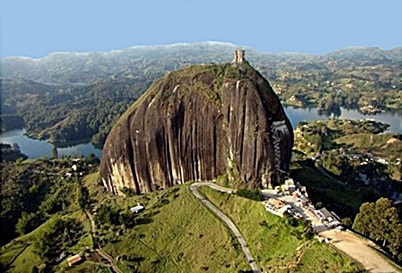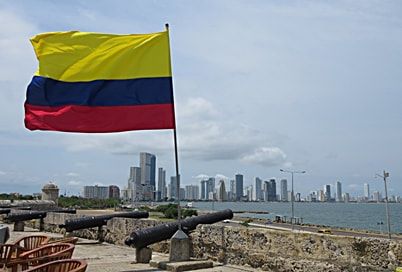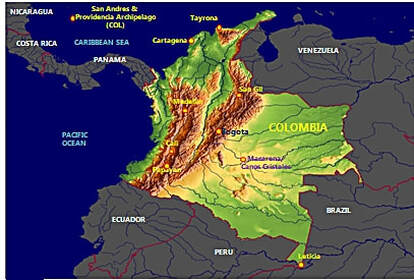Colombia - land of Megadiversity, Coffee & Charm (in EDIT mode)
(COVID-19 Update as @ 03 Nov 2020): In early March 2020, the national authorities decreed that Colombia's land and sea borders should be closed until further notice. This was changed on 19 September 2020, now permitting foreign nationals to visit, but subject to strict entry requirements.
UK FCO Travel Advice - However, Colombia is NOT on the UK list of countries exempt from "all but essential" travel;
US State Travel Advice - Level 4; "Do Not Travel".
(for MORE see links on Travel Advice below)
TRAVEL ADVISORY - COLOMBIA: (Update as @ 03 Nov 2020)
Following months of increasing tensions between the Government and unions, indigenous sectors and students, a National Strike was called in Colombia for 21 November 2019. This resulted in a subsequent spiral of ever more violent demonstrations in the capital, Bogota, and in other major cities. As the year ended, the numbers demonstrating have reduced, as has the violence, but an uneasy calm persists in 2020. For more detail see Travel Advisory links at the bottom of this page.
Following months of increasing tensions between the Government and unions, indigenous sectors and students, a National Strike was called in Colombia for 21 November 2019. This resulted in a subsequent spiral of ever more violent demonstrations in the capital, Bogota, and in other major cities. As the year ended, the numbers demonstrating have reduced, as has the violence, but an uneasy calm persists in 2020. For more detail see Travel Advisory links at the bottom of this page.
|
With golden beaches in both the Pacific Ocean and Caribbean Sea, Andean peaks that top 5,000m, and a luscious Amazonian interior, Colombia has a rich and diverse beauty to offer the most discerning traveller. Also labelled the most ethnically and linguistically diverse country in the world, this is reflected in its music, cuisine and culture by the welcoming people. Put simply, Colombia offers outstanding variety for value, making it the MUST SEE destination for 2020!
|
|
|
Joining Ecuador, Colombia is labled* as one of 17 "megadiverse" countries in the world, ranking first in bird varieties with over 2,000 listed (more than North America and Europe combined), and hosting up to 20% of the planet's other species of flora and fauna! Yet it is only twice the size** of France or California.
(*recognized by Conservation International in 1988) (** Metropolitan France - 550,000 km2; California - 424,000 km2) |
|
|
Its principal eco-systems include Amazon rainforest, highland Paramo/Montane, the Llanos plains, and coastal territory sub-divided into Pacific and Caribbean zones. Finally, its Insular Region off Nicaragua most notably includes the San Andres/Providencia archipelago.
For MORE on the delights to be experienced in each of Colombia's six unique eco-zones, CLICK on the requisite destination BELOW! (in EDIT - MORE to follow!) |
|
|
|
|
|
|
TRAVEL ADVICE & HEALTH Despite a history of crime associated with narcotics and political terrorism, most visits to Colombia are trouble free, but it has still been accorded a Level 2 rating from the US State Department - Exercise Increased Caution! In addition, following months of increasing tension between the Government and unions, indigenous sectors and students, a National Strike was called for 21 Nov 2019. This escalated tensions in the capital, Bogota, and other bigger cities in the country, and flights were interrupted, increasing alert levels. The Alert State has once again returned to Level 2, but social tensions continue to appear in 2020, with National Strikes and state-wide protests. Coupled to the Coronavirus pandemic, this social tension is likely to persist into 2021. Otherwise, tourists may be targeted after visiting ATMs, or defrauded by scams involving criminals posing as local authorities. Counterfeit currency is also in circulation, and weapons are commonly used by thieves and terrorist factions alike. There are also risks that can occur on demonstrations and other political assemblies, and when approaching the border areas with neighbouring countries, especially with Venezuela. The UK FCO site shows a map illustrating "safe" and more dangerous areas. For CURRENT DETAIL click HERE (UK) for current UK FCO advice, or HERE (US) for State Department guidance. There are also health risks when visiting "hot" Amazonia, particularly from Yellow Fever and Zika. Both links above give advice on HEALTH issues, and additional information can be obtained from the (US) Centre for Disease Control & Prevention (CDC) - click HERE.





